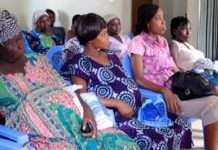
The United Nations Children’s Fund (UNICEF) says introducing Multiple Micronutrient supplements for pregnant women in Nigeria will reduce the high rate of maternal and infant mortality. UNICEF Chief of Nutrition, Nemat Hajeebhoy, stated this during an interview with Newsmen on Sunday in Abuja.
According to the World Health Organisation, Nigeria’s Maternal Mortality Ratio in 2020 stood at 1,047 deaths per 100,000 live births, making it one of the countries with the highest MMR globally.
According to report, Federal Government, has, however, taken steps to transition from Iron and Folic Acid Supplements to MMS for pregnant women to ensure better birth outcomes. The Federal Government also adopted the use of MMS based on the 2020 WHO recommendation on antenatal care for positive pregnancy experience.
So far, this has led to the inclusion of MMS for pregnant women in the ‘National Guidelines for the Prevention and Control of Micronutrients Deficiencies Control in Nigeria’ for improved pregnancy outcomes, compared to IFAs supplementation.
Hajeebhoy said if a mother is healthier, then the chance of death during pregnancy and birth reduces.
She noted that one major concern of public health and nutrition practitioners is the high rate of maternal, neonatal and infant mortality, a situation which can be reversed through MMS.
The UNICEF official added that with MMS, the proportion of children born small for gestational age reduces and there is reduced risk of pre-term and stillbirth babies.
She added, “Similarly, if a child is born healthy, then the probability that the child will die within the first few days of life or even within the first year is significantly reduced. So, if we want to preserve the health of our women and children in Nigeria, especially in those early years and days, then this is what I would call a best buy in public health. We also know that if a mother is not nourished, there is the risk of her having a preterm baby or a stillbirth. The first 1,000 days from pregnancy to the time the child is two years of age is a very important period in terms of growth as human beings and I don’t just mean physical growth, but also mental growth. When a woman is pregnant, she needs to preserve her health so that the child in the uterus can be healthy. So, MMS gives her that boost and all the vitamins and minerals she needs.”
Hajeebhoy also said if a child growing in the uterus does not get enough nutrients, the child is would be small for the gestational age, which translates to malnourished in the womb, but insisted that with MMS, such a situation can be prevented.
The chief of nutrition said there is also a reduction in low birth weight because babies born with low birth weight (less than 2.5 kilogrammes) are at higher risk of infection and even potential death.
The chief said UNICEF and other partners are working with the Federal Government at all levels to ensure that the supplements are widely available and accepted in the country.













